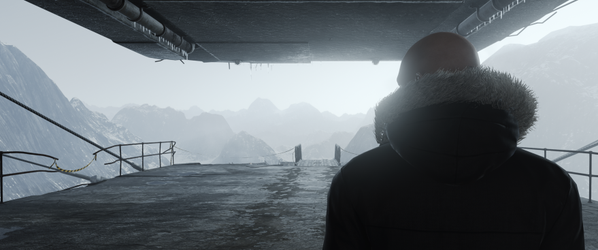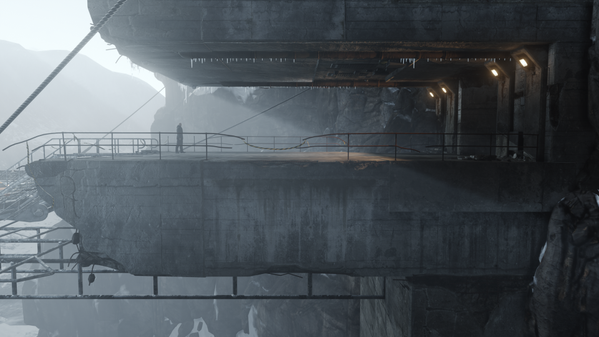Trending
Opinion: How will Project 2025 impact game developers?
The Heritage Foundation's manifesto for the possible next administration could do great harm to many, including large portions of the game development community.
"We know we're doing something new. There's a saying ‘everybody likes progress, no one likes change.’ We fully see that. But going episodic will mean better games, more innovation and more diversity."

The traditional rhythm of video game development has shifted. Where once, a team would weary themselves in so-called ‘crunch’ during the run-up to their game’s launch, squishing bugs and issuing fixes before a pristine gold disc was sent to the manufacturing plant, today the launch of a game is just the beginning of its story.
Fixes, improvements, balancing tweaks, additional characters and features and, increasingly, entirely new chapters in a game’s story have become the norm, thanks to the ease with which patches can be delivered to players via the internet.
There is a shift, too, toward episodic structures, which mimic the familiar delivery mechanisms of TV, with the launch of video game episodes that combine to create a season. Telltale Games, the California-based studio has pioneered the technique in which, theoretically, the development risks are lowered.
For Telltale, it has paid serious dividends. By the end of 2013 the company, which is independently owned, had sold more than 21 million episodes of The Walking Dead, a spin-off to the American horror television series. The success has won the studio yet more high-risk, high-reward opportunities, including the chance to work on the major IPs Game of Thrones, Minecraft and Batman.
Others are following Telltale’s example. Life Is Strange is a 2015 TV-style series of games, split across five episodes. It won major accolades for its storytelling, which draws players in, in the manner of a Netflix series.
Hitman, traditionally a standalone action game, has also just switched to an episodic model for its 2016 release, tomorrow. The challenges for a major blockbuster, with a devoted following, moving to an episodic model are, arguably, different to those faced by adventure-game makers.
I spoke with Christian Elverdam, the game’s creative director, to find out what drive the decision to move toward an episodic structure, and what changes the decision forced in terms of IO Interactive’s working methods.
"Agent 47 is an icon, but part of what makes him iconic is at odds with traditional video game storytelling."
Before we even started thinking about episodic, we started looking at something more fundamental than that: the way digital distribution was reaching critical mass for games. This evolution has already happened with music, film and TV series. Services like Spotify and Netflix are prime examples of this.
The tipping point for us was the moment at which we could see enough people with connectivity to support downloading game content, which is, after all, much larger chunks of data than a film or TV show.
At the same time the policies around digitally distributed content on consoles, governed by Sony and Microsoft, were starting to approach the flexibility provided by PC.
With a clear belief that this critical mass would be met by the time our game was ready to ship, we set out to build the new Hitman.

It allowed us to re-assess the type of storytelling we had come to take for granted in a traditional boxed game. Our main character, Agent 47, is by now an icon, but part of what makes him iconic is, we thought, at odds with traditional video game storytelling. By that I mean the ‘hero’s journey’, familiar from cinema, where our protagonist faces challenges and pressures that, when overcome, leave the hero stronger and changed for the better by the story’s conclusion. There is a change and a resolution.
This story structure doesn’t work with Agent 47 because he is, essentially, a blank canvas on which players can express themselves. Furthermore this is a game where freedom of approach is one of the most critical features; the setup is based on a silent master assassin taking out his targets in unforeseen and creative ways and where the turn of events are left mostly up to the players to decide.
The gameplay conflicts with the classic storytelling model. With a new way of distributing the game we could now allow ourselves to be inspired by a new, very strong trend - the reinvention of the TV series.
"We know we're doing something new. There is a saying ‘everybody likes progress, no one likes change.’ We fully see that."
If you take a character like Sherlock Holmes for example, the audience is fascinated by each mystery and crime he must solve. They’re not so interested in how he changes as a character, but rather in how his character behaves as he comes under pressure in each episode and goes about solving the problem. It is the meeting of the profession and the character that together create the fascination.
It is not far from Agent 47, only he and the player need to get away with the perfect crime instead of solving it. You then need to put a stable cast around Sherlock or Agent 47 to make the eccentric and somewhat antisocial main character work. Agent 47 always had his handler, Diana Burnwood, as a contact to the world around him.
And the targets are the problems that constantly needs solving. If we added some lasting antagonists to this, or maybe even a classic nemesis to drive a longer agenda, we felt we had the perfect foundation for telling stories, that would work with, not against, the essential character of Agent 47.

First of all we had to restructure the game engine, from a static ‘ship it once’ engine to a tech foundation where we are able to alter content and change game rules with only minimal patches and small downloads. At the same time we needed to reorganize ourselves as a studio.
We now have a sizable live team, which is more akin to the structure of an MMO, than a classic game. (That’s not to say that the new Hitman game is an MMO.)
It also means that as a studio we had to make sure we avoided crunch. Since we release content frequently over a period of many months, we cannot have the team burning out by the time we ship the first episode.
In an industry where the norm is ‘all hands on deck’ for an extended period, allowing for downtime after the disc had been mastered, we had to come up with a long-lasting work environment. Even if we have been very busy shipping Hitman we did not do endless months of crunch and we do not see this as a viable part of our future.
Finally, one of the clearest benefits we have now is watching players on YouTube and Twitch. Nothing makes a game team more honest than looking at people playing your game. You can celebrate their successes, when a moment or a game mechanic plays out exactly as you had planned. And you can agonize when something does not work as intended, or when a player gets stuck or frustrated.
The understanding of what works and what doesn’t becomes crystal clear and the motivation to improve the game comes from within the team. The big difference is that this clarity and drive does not come once, when the disc ships, but around each and every episode.

We know we're doing something new. There is a saying ‘everybody likes progress, no one likes change.’ We fully see that.
"By being ‘live’ we have introduced a new type of gameplay. We have targets that only appear briefly in the game world, say over a 48-hour period. In these scenarios the outcome is final – there’s no option to replay or save your progress."
We believe that as the season goes on, and concludes, people will see the benefits of how we developed the game. But we also accept that people see this as a risk. It’s a risk that they might not be willing to take for $60.
So we created an entry point, the ‘Intro Pack’, where you only pay for one episode at a time, which seems fair. We don't want to force people to a commitment. The game will speak for itself and you can jump in at any point or wait for the season to conclude.
Traditionally we’ve relied on the story unfolding is a strong component of this. In Hitman we have always had the promise of globetrotting, so I think the excitement of traveling to new destinations is also key. From the fashionable level in Paris, to the lazy, beautiful and expansive Italian town on the Amalfi coast, to bustling markets of Marrakesh, Morocco with a military coup threatening to happen. A lot of the appeal is in having the chance to go to places you cannot normally visit.
Then there are the targets themselves: a Russian oligarch running a clandestine spy network; A troubled bioengineer with a sinister purpose; A corrupt general on the verge of taking control of a country. We want diverse targets and diverse locations.
Lastly, by being ‘live’ we have introduced a new type of gameplay. We have targets that only appear briefly in the game world, say over a 48-hour period. In these scenarios the outcome of the mission is final, if the target dies or if you die.
You can only play once – there’s no option to replay or save your progress. The moment when you are about to pull the trigger carries with it a tension we have not seen before.

There is always a risk when you are among the first to do something. Will people get it? But we already have seen a lot of interest from colleagues in the industry, who want to copy our example.
There is no question, in my mind, that it is a very natural and beneficial evolution. It brings the players and the developers much closer together, which is almost always a good thing. It will mean better games, more innovation, and more diversity.
Music, film and TV series have evolved this way. Games are a natural next step.
You May Also Like